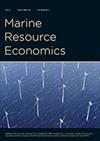利用海洋采样数据估算商业捕鱼行程成本
IF 1.7
3区 经济学
Q2 ECONOMICS
引用次数: 6
摘要
在估计商业捕鱼成本时,选择偏差可能会影响非人口普查抽样方法得出的任何模型。在美国东北部,商业捕鱼运营成本模型可能存在选择偏差,因为它们通常是使用为生物目的而非经济目的收集的数据进行估计的。我们使用加权/未加权最小二乘法和Heckman样本选择模型研究了抽样偏差对出行成本模型估计的影响。结果表明,(1)携带观察者的旅行倾向相对于成本而言不是随机的,(2)在所研究的大多数成本模型中都存在选择偏差。为了衡量选择偏差的大小,我们比较了未加权最小二乘法和赫克曼模型的结果。模型之间的差异可能导致在子事件级别和估计出行成本最大值时得出错误结论。结果表明,在使用抽样捕鱼成本数据时,评估和纠正选择偏差是必要的。本文章由计算机程序翻译,如有差异,请以英文原文为准。
Estimation of Commercial Fishing Trip Costs Using Sea Sampling Data
When estimating commercial fishing costs, selection bias can impact any model derived from non-census sampling methodologies. In the northeastern United States, commercial fishing operating cost models may suffer from selection bias, as they are often estimated using data collected for biological, rather than economic, purposes. We investigate the effects of sampling bias on trip cost model estimations using weighted/unweighted least squares and Heckman sample selection models. Results suggest that (1) the propensity for a trip to carry an observer is not random with respect to costs and that (2) selection bias exists in the majority of cost models investigated. To gauge the magnitude of selection bias, we compare results of the unweighted least squares and Heckman models. The differences between models can lead to erroneous conclusions at the subfleet level and in estimating trip cost maxima. Results suggest that assessing and correcting for selection bias is necessary when using sampled fishing cost data.
求助全文
通过发布文献求助,成功后即可免费获取论文全文。
去求助
来源期刊

Marine Resource Economics
农林科学-渔业
CiteScore
4.30
自引率
10.30%
发文量
25
审稿时长
>12 weeks
期刊介绍:
Marine Resource Economics (MRE) publishes creative and scholarly economic analyses of a range of issues related to natural resource use in the global marine environment. The scope of the journal includes conceptual and empirical investigations aimed at addressing real-world oceans and coastal policy problems. Examples include studies of fisheries, aquaculture, seafood marketing and trade, marine biodiversity, marine and coastal recreation, marine pollution, offshore oil and gas, seabed mining, renewable ocean energy sources, marine transportation, coastal land use and climate adaptation, and management of estuaries and watersheds.
 求助内容:
求助内容: 应助结果提醒方式:
应助结果提醒方式:


